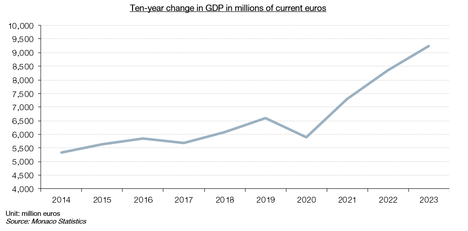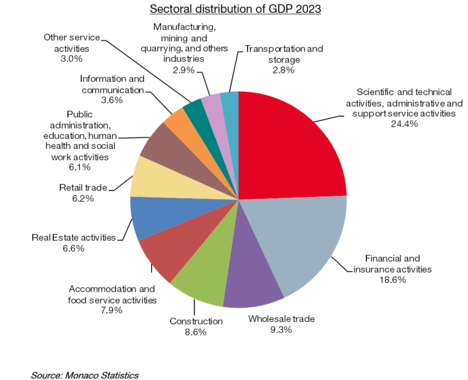
Gross Domestic Product
| 9.24 | CURRENT BILLION EUROS |
Source: Monaco Statistics
See source |
| +5.0 | % COMPARED TO 2022 |
Source: Monaco Statistics
See source |
The GDP of the Principality of Monaco stands at 9.24 billion euros in 2023, up from 8.36 billion in 2022. Its inflation-adjusted growth is therefore 5.0%.
Since 2014, GDP has grown by almost 50%, compared with 27% worldwide, 14% in the eurozone and around 10% in France.
Because of the method used in Monaco to define GDP as an indicator of income, it is divided into four components :
- Earnings before interest, taxes, depreciation and amortisation (EBITDA) can be defined as the "remuneration" (productive income) of companies. At 4.4 billion euros, it represents 45.0% of nominal GDP excluding subsidies in 2023. Up by 9.0%, it is still the largest contributor to national value added.
- Compensation of employees, which corresponds to the redistribution of annually created wealth in the form of salaries and social security contributions, amounts to almost 4 billion euros this year (40.6% of GDP excluding subsidies). It grew by around 10%, which is more than twice as much as the number of active employees.
- At 1.4 billion euros (+21.6%), the share of taxes in GDP excluding subsidies rose by 3 points to 14.4%.
- Subsidies also increased by 22.1% to almost 500 million euros.
Sectoral trends are mixed, with nominal variations ranging from around -6% to +30%. Seven Major Economic Sectors (MES) increased their GDPs compared to the previous year, while five contracted.
The main contributors to GDP continue to be Scientific and technical activities, administrative and support service activities, Financial and insurance activities and Wholesale trade. They now account for more than half of the wealth created in the area.
| 98,830 | current euros |
Source: Monaco Statistics
|
| +2.4 | % COMPARED TO 2022 |
Source: Monaco Statistics
|
GDP per capita is set to approach 100 000 euros in 2023, after real growth of 2.4%.
| 145,625 | CURRENT EUROS |
Source: Monaco Statistics
|
| +0.1 | % COMPARED TO 2022 |
Source: Monaco Statistics
|
GDP per employee, which can be considered as an indicator of economic productivity, stands at 145,625 euros this year. Adjusted for inflation, it is stable compared with 2022, as is the gap with its French equivalent.

- 12 August 2025 Barometer Retail trade : June 2025
- 12 August 2025 Barometer – Manufacturing industry : June 2025
- 12 September 2025 Barometer Retail trade : July 2025
- 12 September 2025 Barometer – Manufacturing industry : July 2025
- 17 September 2025 Quaterly Economic Report Q2 2025



